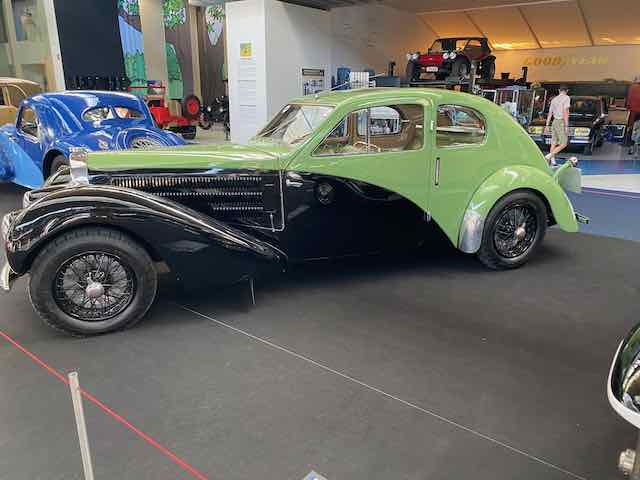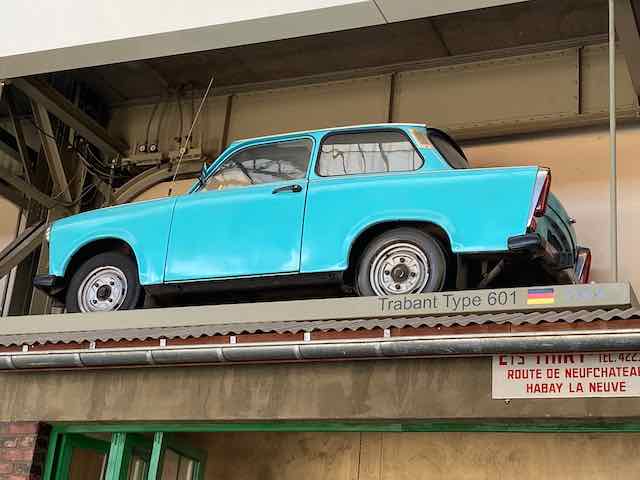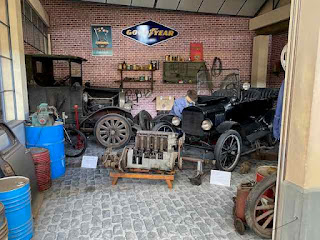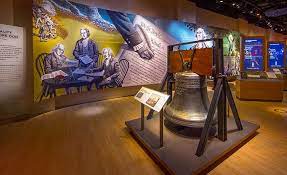In 2014, a 197.5km stage of the Tour de France ended with
the climb from Grenoble to Chamrousse
This weekend, I achieved one of my bicycle travel goals. It happened at the last minute, without a plan, in a series of delightful discoveries.
That goal was to ride Tour de France climbs in the Alps or the Pyrenees before I am too old to finish a seven-to-twenty-mile climb and then ride back down.
The view from Acrobastille, Grenoble
On Friday evening, I rode up a short, steep climb to a Acrobastille park just north of Grenoble. The steepest grade was 22%, the average grade, according to Strava was 15.6%. The road was three meters wide, less in some places, with tight switchbacks every few hundred meters.
Cars were speeding up and down the hill toward restaurant at the park at the top of the road. A few of the hairpins were so tight that larger cars stopped and backed up a little in an effort not to hit the barriers at the edge of the road. Here is the climb on the
ClimbFinder website.
The road was painted with names of riders for most of the mid-hill steepest section. I was moving at barely over walking speed. I imagined Tour de France riders zooming past me at more than 20kmh. At the top I turned around and headed back right away. Sundown was in 15 minutes. I was glad the carbon bike I rented had disc brakes. I used them hard going into the turns on the way down.
When I got back to the hotel room I started searching for destinations for the next day’s ride. I looked further north. I knew there was a long easy climb to the south on the long road to Alpe d’Huez, but the fabled mountain was too far for me to ride there—150km from Grenoble. (I rode Alpe d'Huez in 2000 and 2005. It was as tough as advertised.)
I decided to ride east to the ski resort at Chamrousse. It would be a five-mile ride through the city of Grenoble then a 20-mile climb: a six-mile climb on a five-percent grade, followed by a flat mile through a resort town then an eleven-mile eight-percent grade to the summit: almost 1800 meters of climb, more than a mile vertical.
Chamrousse was a Tour de France climb in 2001 (time trial), 2014, and 2017.
This sign was on the lower slop. When I saw it, I thought,
'No chance I am violating that speed limit.'
The first climb was fine, but the second climb went from slow to slower. The long climb was in forest so I could never see more than a few hundred meters ahead. I would ride through a switchback then a kilometer of winding road, then another switchback. I was moving faster than the previous day but only just. I mostly rode 4-5mph with occasional short bursts of speed standing on the pedals going 7-8mph!
Early on the long climb, 800 meters of altitude to go
Three miles from the top I was out of water and thinking about turning around. But I kept going and made it to the largely deserted resort at the top. I got water and a Coke and a sandwich. I was going to take pictures at the top, but I got on the bike, and it felt so good to be rolling on a flat road near the top. I was speeding along at 10mph!
Then I took the downward turn toward the intersection at the top of the climb. I leaned down, shifted to the highest gear, and flew down the winding road into the forest.
For the next 11 miles, more than 20 minutes, I sped down the eight-percent grade, braking just before the switchbacks then pedaling out. By the time I was in the village at the bottom of the first climb, my arms were aching from leaning into the handlebars while braking.
The road was mostly smooth so I could swing wide going into turns and lean deeply without getting bounced by bad pavement.
Even with 40mph wind in my ears, I could hear cars coming up and could definitely hear the motorcycles using the mountain for a high-speed thrill ride.
Going into a hairpin on the way up a Suzuki FZR flew past me. The ride-white-and-blue-leather-clad rider leaned so far in the turn I heard the hockey puck on his left knee scrape the pavement for a second. He was followed by three other touring motorcycles that went progressively slower through the turn.
Since I was going 5mph, I could judge their style as the flew past me.
I saw no motorcycles on the way down. I saw several bicycle riders making their slow way up the mountain. I also saw a few cars coming up, but only once did we pass by each other in a turn. European drivers hold their lane in hairpins, and I was tight on the inside of the turn.
At the bottom of the steep hill in the village I rolled slowly through the tourist traffic, then started down the shallower six-mile descent onto the city. The road was smooth and straight with few turns. I rode back to the
Natura Velo bike shop and returned the bike. They charged me for one 24-hour day from Friday at 6:30pm to Saturday at 5pm. The guy renting the bikes was friendly and helpful.
As I walked out of the shop, I ended the Strava trip down the mountain. I walked to a coffee shop and sipped a cappuccino while I looked at what Strava said about my trip.
On both rides it is clear I am among the worst riders going uphill and the best descending.
Of the 2,800 riders who climbed the short, steep hill to Acrobastille, I was in 2,551st place. I was second of two in my age group, 70-74.
Going down the hill, I was 772nd of 2,700 riders of all ages and 1st of five riders in my age group by more than a minute.
On the climb to Chamrousse, I was 4,467th of 4,562 riders going up. On the steep 11-mile descent that begins the road back to Grenoble I was 1,178th of 3,556 riders but #1 of 22 riders in my age group. I was a half-minute ahead of second place. The other guys on the leaderboard live in the area so it was fun to think I could compete with guys who have made many trips up and down the mountain—at least on the descent.
Both the climb and the descent give me joy in very different ways. The climbs were so difficult I thought about quitting both. On the first I told myself it was getting dark soon and I did not want to descend after sundown. Near the top of the climb to Chamrousse I was moving so slowly that even the 5km to go sign meant I had almost an hour to ride. But I couldn’t (wouldn’t let myself) stop in either case. The 5km sign gave me some inspiration; I went just a little faster.
The last time I rode in the Alps and the Pyrenees was in 2005. I am not sure I will ride the great climbs of France again, but I am beyond happy that I was able to ride Acrobastille and Chamrousse.












































